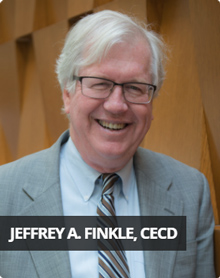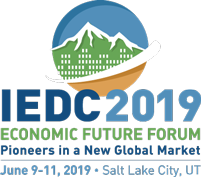Managing Economic Development Organizations
Date: June 6-7, 2019
Location: Salt Lake City, UT
» Agenda
» Instructors
» Certification
» Accommodations/Training Location
» Registration
This course is held in conjunction with the 2019 Economic Development Future Forum and Economic Development Credit Analysis.
This advanced course will focus on the key principles and practices of professional management in economic development. It will define excellence in economic development and explain the fundamentals of managing for results, outcome-based performance, organizational assessment, stakeholder identification, vision and mission scope, organizational culture and more. Also, participants will learn how to engage their board or council, staff and community stakeholders, constituents, and customers to achieve results in job creation, tax-base stabilization and community growth and development. Since EDOs differ from one another depending on their available resources, location, and mission, this course is designed to equip a leader of any organization to make the right decisions.
Course Highlights
• Outcome-based management and performance
• Managing conflict and developing a statement of ethics
• Understanding and evaluating the EDOs core competencies
• Serving the customer and measuring customer satisfaction
• Improving knowledge management and internal processes
• Working with board/city council members, staff and community stakeholders
• Team building, determining hiring needs, and managing budgets
• Leveraging existing resources and working with regional organizations
Agenda
8:30 a.m. - 9:30 a.m. |
Registration |
9:00 a.m. - 10:30 a.m. |
Managing for Excellence: An Introduction to Managing Economic Development Organizations Successful Economic Development Organizations (EDOs) are distinguished by their ability to be innovative in their program activities and to quickly react to changes in the marketplace. To do this, an EDO manager or Executive Director must engage the board of directors and staff to create an efficient and effective organization. Participants will be introduced to the various aspects of EDO management, with an eye toward achieving organizational excellence. |
10:45 a.m. - 12:00 p.m. |
Defining an Organization's Identity Before embarking on ambitious plans for community improvement, EDO leaders must first determine "who" or "what" the organization is. In order to plan for where you want go, you must know where you are. In this session, participants will look closely at the structure of their own organizations, including formal components such as value and mission statements and less tangible elements like organizational culture and communication styles. |
12:00 p.m. - 1:15 p.m. |
Lunch on your own |
1:15 p.m. - 2:45 p.m. |
Envisioning the Future An effective organization has a clear sense of itself and where it wants to go. It can clearly articulate its direction, purpose, goals and rationale for the actions it is pursuing. This session will examine strategic planning and how EDO leaders can best facilitate that process among stakeholders and the Board of Directors |
3:00 p.m. - 4:30 p.m. |
Serving the Customer EDOs have different ways of defining their customers. Some may see city hall as the primary customer, others business leaders or the community as a whole. All EDOs should have a clear sense of who their customers are and what they expect. If the customer's perception of your organization is positive, i.e., they perceive you will offer them a quality product, they are likely to continue to do business with you. This session will focus on how organizations can meet and exceed consumer expectations. |
9:00 a.m. - 10:15 a.m. |
Improving Internal Processes In order to better serve the customer, it is important to closely explore the organization's internal processes. This session will look at ways for EDOs to best align organizational processes toward delivering customer value. In addition, participants will identify methods that will help structure meetings and develop trainings so that employees are able to work collaboratively to solve problems and deliver results to the customer. |
10:30 a.m. - 11:45 a.m. |
Defining Leadership EDOs need strong boards to provide strategic leadership and to leverage resources. Unfortunately, many boards fall short of their full leadership potential. How can the expertise and experience of board members best be utilized? This session will explore some of the pitfalls of board management and look at various strategies to fully engage board members in developing and implementing a strategic agenda. |
11:45 a.m. - 1:00 p.m. |
Lunch on your own |
1:00 p.m. - 2:15 p.m. |
Measuring Performance / Case Study With internal processes improved, how can an organization know if the changes are having an impact on performance? To do this, EDO managers employ a number of tools to monitor day-to-day progress, assess performance and most importantly, measure community impact. In this session, participants will review the steps for successful achievement of outcome-based performance in an organization. |
2:30 p.m. - 4:15 p.m. |
Organizational Ethics: Focus on EDOs As organizations and institutions evolve, underscoring the need for regular education about acceptable conduct in the profession and the organization is needed to ensure long-term growth and development. This session will focus on ethics and EDOs and it help participants work through case studies to better understand ethics and economic development. |
4:15 p.m. - 4:30 p.m. |
Wrap-up/Evaluation/Certificates |
* Agenda subject to change
**PLEASE NOTE: In order to receive full IEDC certification credit for this course and a certificate indicating course completion, participants must attend the entire course and stay through the final session on the last day. Please make travel plans accordingly.**
Instructors
 Dennis G. Coleman, CEcD, FM, HLM
Dennis G. Coleman, CEcD, FM, HLM
Co-Founder and Partner
Community and Economic Development Solutions LLC
As Founder and Principal of CED Solutions, Denny Coleman assists clients with overall project visioning, strategy, leadership, and consultation, utilizing his four decades of local and national experience to help them realize their goals. Mr. Coleman’s reputation as one of the leading economic development professionals in the United States, combined with his deep knowledge of development strategies, enables him to bring progressive ideas and forge effective networks among multiple and diverse stakeholders to advance the most complex initiatives.
Between 1990 and 2015, Mr. Coleman served as Chief Executive Officer of the St. Louis County Economic Council, which eventually merged with the City’s St. Louis Development Corporation, under his leadership, to form the St. Louis Economic Development Partnership. Over the course of his tenure, he has guided a national best practice model to help the region’s economy recover after losing 59,000 jobs and $4.4 billion in wages in defense-related jobs. He was instrumental in the acquisition and development of the World Trade Center St. Louis, the Metropolitan Education Training Center, Foreign Trade Zone expansion, a regional network of business incubators, and major projects such as the 550-acre NorthPark business park, an $882 million development in Lemay, and the Buzz Westfall Plaza/Northland Shopping Center redevelopment. In 2013, he completed the first St. Louis City and County joint strategic plan.
In all, Mr. Coleman's leadership has helped generate and/or retain tens of thousands of jobs in the region and attracted in excess of $2 billion in public and private investment. Furthermore, his vision and dedication has helped imbue the local economy with a spirit of innovation, claiming the number one spot for startups, a booming biotech cluster, and fastest growing tech job market.
On a national level, Mr. Coleman has served as chairman of the International Economic Development Council. He has testified before Congress on several occasions and continues to be a highly respected national authority on economic development issues and policy, including the economic impact of immigration, solutions for income and equality and the interface between talent development, job training and economic development. For his efforts, he has been recognized four separate times by the St. Louis Business Journal as one of the “Most Influential St. Louisans,” and has received numerous other local, state and national awards and commendations, specifically including the Lifetime Achievement Award for Excellence in Economic Development from the International Economic Development Council (IEDC).
 Jeffrey A. Finkle, CEcD
Jeffrey A. Finkle, CEcD
President & CEO
International Economic Development Council
As President and CEO of the International Economic Development Council (IEDC), Jeff Finkle is a recognized leader and authority on economic development. With the formation of IEDC in 2001 following the merger of the Council for Urban Economic Development (CUED) - where he was president for 15 years - and the American Economic Development Council (AEDC), Jeff set the course for a more effective and influential organization. Today IEDC is the world's largest economic development membership organization and is a $5 million annual operation that is renowned for its leadership in professionalizing and diversifying the field of economic development.
Jeff previously served as Deputy Assistant Secretary in the U.S. Department of Housing and Urban Development, and has received numerous awards over the years for his commitment to making sustainable economic development a priority in communities of all sizes. Significantly, in 2011 he was lauded by the U.S. Department of Commerce for his 25 years of stewardship over CUED and IEDC. Moreover, as a longtime leader in community service and philanthropy, in 2005 Jeff organized 250 economic development volunteers to work in Gulf Coast communities endeavoring to recover from Hurricane Katrina. In 1989 he also founded the Bollinger Foundation, a non-profit organization that provides financial assistance to children who have lost a parent who worked in the field of economic development.
A frequent lecturer and author of numerous articles, Jeff has appeared on CBS Sunday Morning, Fox television and the Journal Report on PBS. He received a Bachelor of Science degree in communications in 1976 from Ohio University in Athens and pursued graduate studies in business administration at Ohio State University. He maintains a strong connection with Ohio University’s Voinovich School for Leadership and Public Affairs.
 Certification
Certification
This course meets the professional development requirements for the Certified Economic Developer (CEcD) exam. CEcDs earn recertification credits for participating.
Accommodations/Training Location
Marriott Salt Lake Downtown City Creek
75 South West Temple
Salt Lake City, UT 84101
IEDC Room Rate: $221
Group Cut off: Wednesday, May 15, 2019
Registration
By April 26 |
April 27 - May 24 |
*After May 24 |
|
IEDC Member |
$490 |
$630 |
$650 |
Nonmember |
$640 |
$780 |
$800 |
Full Time Student** |
$105 |
$125 |
$145 |
*Walk-in registrations will be accepted. Full payment must be made on-site in order to attend the course.
** Copy of current transcript required.
Individual paying by credit card: Click this button if you are registering as an individual IEDC member or nonmember and paying by credit card.
Partner, group or individual paying by credit card, check or purchase order: Click this button to download a form (PDF) if you are paying by check or purchase order, or registering with a promo code. Form must be faxed or mailed, and accompanied by payment.
Should you have difficulty registering online, please download the course registration form (PDF).
Refunds less a $75 cancellation fee will be issued for all cancellations received in writing to fax: (202) 223-4745 or email: prodev@iedconline.org at least 10 business days prior to the course - please allow 3-4 weeks. All registrations regardless of payment status are subject to the $75 cancellation fee. No refunds or credit transfers to a future course will be issued for cancellations received within 10 business days of the course. Telephone cancellations are not accepted. Attendee substitutions for a course may be made at any time prior to the course.
